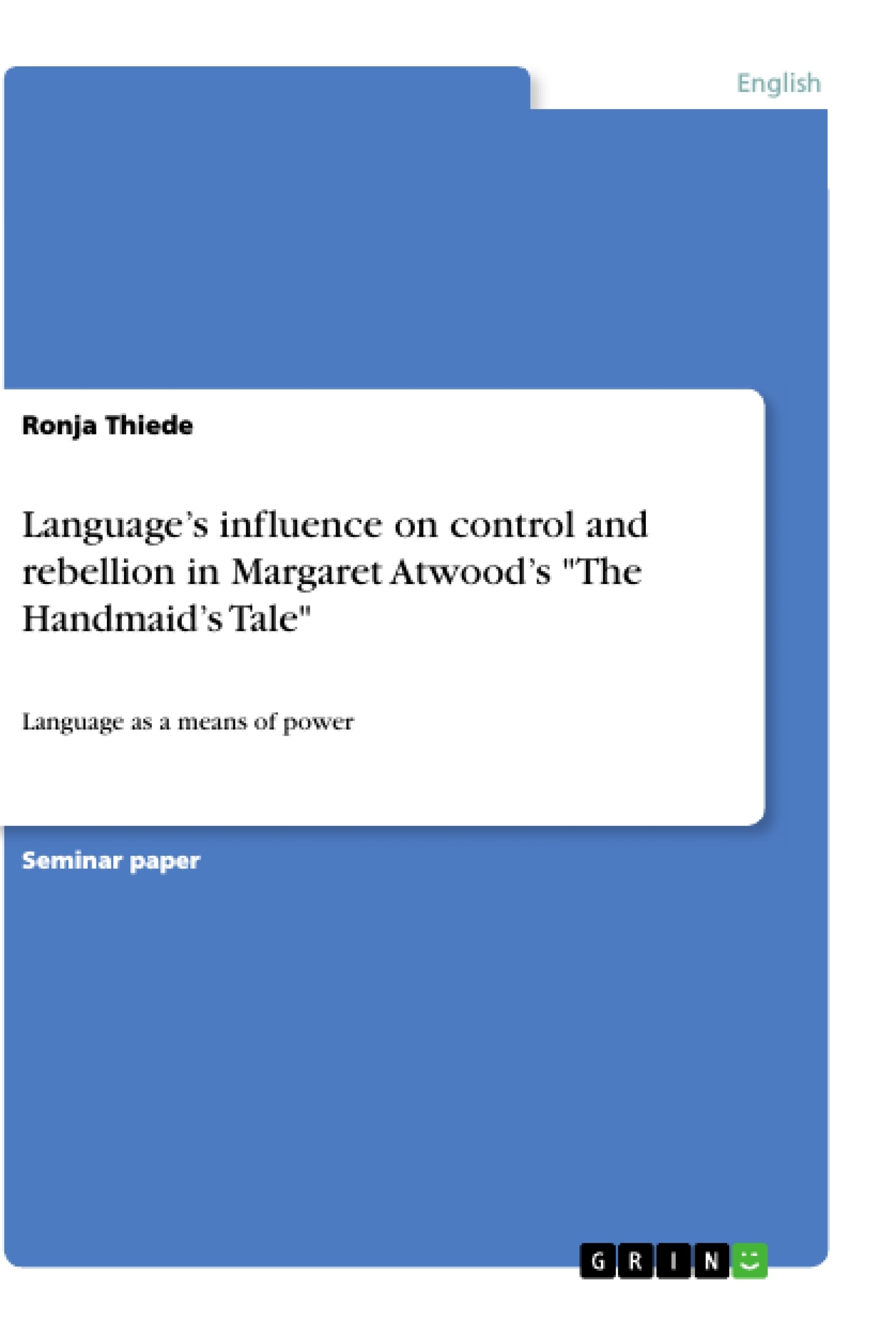Overall, Atwood utilized Gilead’s oppressive manipulation of language in "The Handmaid’s Tale" to reveal the hierarchical dynamics of power in the theocratic state. Therefore, it is vital to determine in how far Gilead’s discourse is used to maintain the existing power structures, but also whether, and if so, in how far it is used to offer resistance against the state’s rigid hierarchy.
Therefore, it will first be analyzed what Gilead’s social structure looks like, before the highly original thoughts of Pierre Bourdieu on the relations among language, power and politics will be introduced to facilitate a real understanding of the correlation of language and power. After that, a closer look at the concrete content of the novel and particular text passages will give an insight into how the Gileadean power structures are maintained through the use of language. Following this, it will then be analyzed how language also enables Gilead’s opponents, in general, but mainly, the novel’s first-person narrator Offred, in particular, to offer resistance. Therefore, it will first be described how the coexistence of two discourses can be a threat to the system, before it will be dealt with Offred’s main means of resistance: her storytelling.
Table of Contents
- Introduction
- The social hierarchy in the dystopian state of Gilead
- Language and power in Pierre Bourdieu's theory of power
- Language as a means of power in Margaret Atwood's The Handmaid's Tale.
- Language and governmental control.
- The Red-Center, a brainwashing institution.
- Restricted literacy.
- Restricted oral communication: Forbidden words, fixed expressions, silence………………………………….
- Taking names
- Psychological split..............
- Language as a means of resistance......
- Reflections on words and meanings..
- The coexistence of two discourses and its impact on the power relationship between Offred and the Commander.
- The power of words and naming.
- A compromised resistance.
- Resistance through storytelling.
- Language and governmental control.
- Conclusion.....
- Bibliography..
Objectives and Key Themes
This essay examines the role of language in maintaining and challenging power in Margaret Atwood's dystopian novel The Handmaid's Tale. By analyzing the oppressive linguistic structures imposed by the totalitarian regime of Gilead, the essay explores how language serves as both a tool of control and a means of resistance. Furthermore, the essay aims to demonstrate how the novel's narrative, particularly through the voice of the protagonist Offred, highlights the complex interplay between language, power, and individual agency.
- The manipulation of language for governmental control in Gilead.
- The relationship between language and power in the context of a totalitarian regime.
- The use of language as a tool of resistance against oppressive power structures.
- The individual's struggle for agency and self-expression within a controlled linguistic environment.
- The interplay between language and identity in shaping individual perceptions of power.
Chapter Summaries
The essay begins with an introduction that situates The Handmaid's Tale within the genre of dystopian literature and highlights its critique of contemporary sociopolitical trends. It then delves into the social hierarchy of Gilead, emphasizing the strict segregation of men and women and the systematic oppression of women based on their reproductive capabilities.
To provide a theoretical framework for understanding the relationship between language and power, the essay introduces the ideas of French sociologist Pierre Bourdieu, who argues that language serves as an instrument of power within social contexts. This theoretical perspective informs the subsequent analysis of how Gilead's totalitarian regime employs language to control and manipulate its citizens.
Focusing on the concrete examples from Atwood's novel, the essay explores the various ways in which Gilead manipulates language to maintain its oppressive system. This includes the use of restricted vocabulary, the suppression of critical thinking, and the enforcement of a rigid linguistic code that reinforces the state's ideology.
The essay then explores how language can also be a means of resistance in Gilead. It analyzes how individuals, particularly Offred, challenge the state's linguistic control through acts of subversion, storytelling, and the preservation of their own individual narratives. These acts of resistance serve to undermine the state's authority and provide hope for individual agency and autonomy.
Keywords
The essay focuses on the key themes of power, language, control, resistance, dystopia, and feminism. It draws upon the theories of Pierre Bourdieu and explores how these concepts are manifested in Margaret Atwood's The Handmaid's Tale, particularly in the context of Gilead's totalitarian regime and the protagonist Offred's experiences.
- Quote paper
- Ronja Thiede (Author), 2018, Language’s influence on control and rebellion in Margaret Atwood’s "The Handmaid’s Tale", Munich, GRIN Verlag, https://www.grin.com/document/469959




